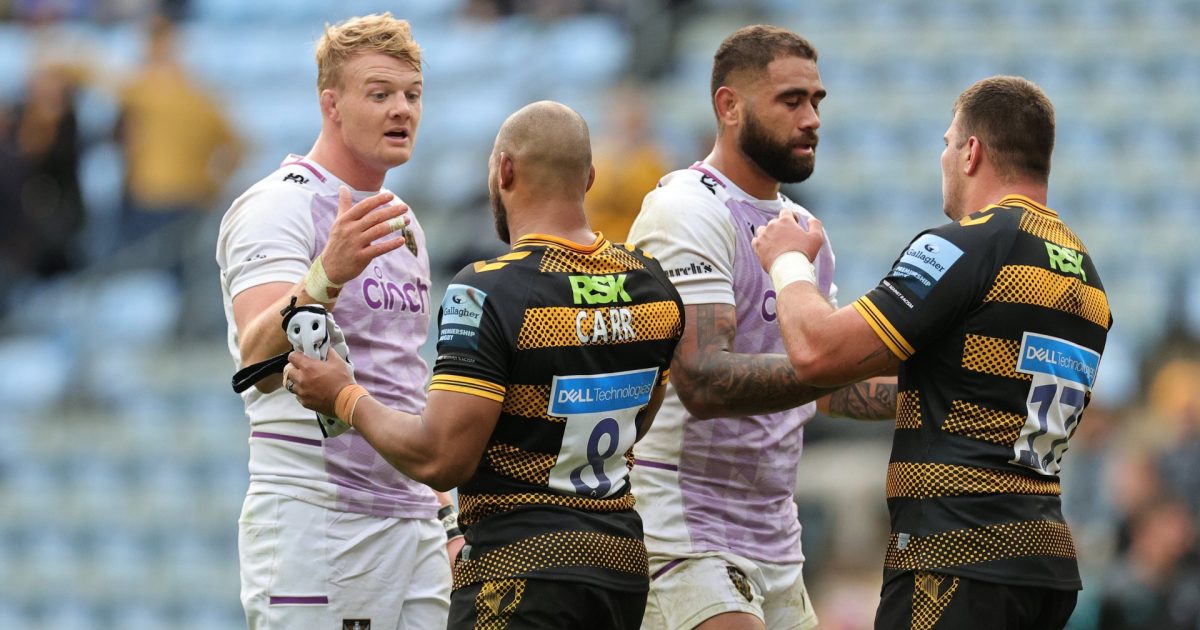The 'one thing' Northampton want after Wasps and Worcester collapse

Northampton CEO Mark Darbon has penned an open letter to supporters, informing them of the governance changes that are being negotiated at Premiership Rugby level following the demise earlier this season of Wasps and Worcester.
The emergency reorganisation of the league from a 13 to an eleven-team league had a huge impact on the fixtures schedule, resulting in the Saints securing a late November friendly with the Barbarians at Franklin’s Gardens to help plug the gap in their calendar,
Darbon has now written a New Year message to Northampton supporters, updating them on the outlook for 2023 while also shedding some light on the plans that Premiership Rugby have for the 2023/24 season which will begin while the Rugby World Cup is reaching its conclusion in France next October.
“The sad demise of Wasps and Worcester Warriors earlier in the season has left Premiership Rugby with a number of challenges to contend with and, as it stands, it feels like there are currently as many questions as there are answers,” outlined Darbon, who has developed a habit of keeping Northampton supporters informed through the regular publication of open letters.
“However, I am able to update you on a few details of what the 2023/24 season structure will look like, which I wanted to share with you. A cup competition will kick the 2023/24 campaign off during the first half of September, with the Gallagher Premiership following a few weeks later to minimise any disruption caused by the Rugby World Cup in France.
'I can’t imagine how someone like Ted Hill feels with Worcester being his childhood club & them potentially being on their final leg' @LewisLudlam talks @SaintsRugby growing the game, Worcester & why he chose rugby over football w/ @heagneyl ??? #HARvNOR https://t.co/TiFRHcsdpg
— RugbyPass (@RugbyPass) October 2, 2022
“It is still unclear how many teams will play in the Premiership next season, but we are optimistic there will be more clarity and a finalised season structure confirmed over the next month or so. Rest assured, the club will ensure all season tickets are priced appropriately based on any confirmed changes to the structure – but, as demonstrated by the organisation of the exhibition fixture against the Barbarians in November, we will also continue be proactive to deliver a fantastic experience for our loyal supporters if we are faced with ongoing uncertainty or late changes.
“One thing we are in favour of at Saints, particularly after everything that has gone on at Worcester and Wasps, is Premiership Rugby having a greater visibility over the finances of its clubs. To make good, sustainable financial decisions across the league, you need to have all the information in front of you.
“If we are to build a sustainable model that works for everyone, it requires collaboration. This will of course present some challenges but if we are to make the Gallagher Premiership as successful off the pitch as the on-field product is compelling, now is the time for the league to evolve and improve the financial visibility of all clubs.
“Encouragingly there are positive steps being taken at league level on this front, as well as some planned improvements to the overarching governance and decision-making structures which will streamline the way the league and clubs work.
“At Saints, our model has always been very clear; we operate within the envelope of our own resources and at a time where everyone has felt the squeeze on their finances, we were extremely proud to announce our annual results for the 2021/22 season a month or so ago.
“We continue to operate in a challenging environment, but have recovered strongly after a difficult two years during the pandemic and are in a resilient position with a clear plan to ensure the club is financially sustainable in the long term.”












































































2023-24 should be as stated, the "transitional season"
Premiership: 11 clubs, 20 matches, 1 relegation
Championship: 12 clubs, 22 matches, no promotion, 2 relegated (based also on financial outlook)
Then, 2024-25 and beyond very simple.
Premiership & Championship, 10 clubs a piece, 18 matches, 1 up, 1 down. Ring fenced below the Championship.
RFU Cup - All 20 Prem & Champ clubs, 5 groups of 4, group winners plus 3 best second place teams go to knockouts. Each group is 2 Prem teams, 2 Champ teams.
Out of Premiership's control alone but additionally, I'd change both ECPR comps back to 20 a piece with a qualification format of
URC - 8
Top 14 - 7
Premiership - 5
Four groups of 5, group single round robin, top 2 advance to knockouts.
Good for him. Sensible comments.